2020初中英语人教版七年级下册 Unit 4 Don’t eat in class.单元质量检测试卷(含答案)
文档属性
| 名称 | 2020初中英语人教版七年级下册 Unit 4 Don’t eat in class.单元质量检测试卷(含答案) | 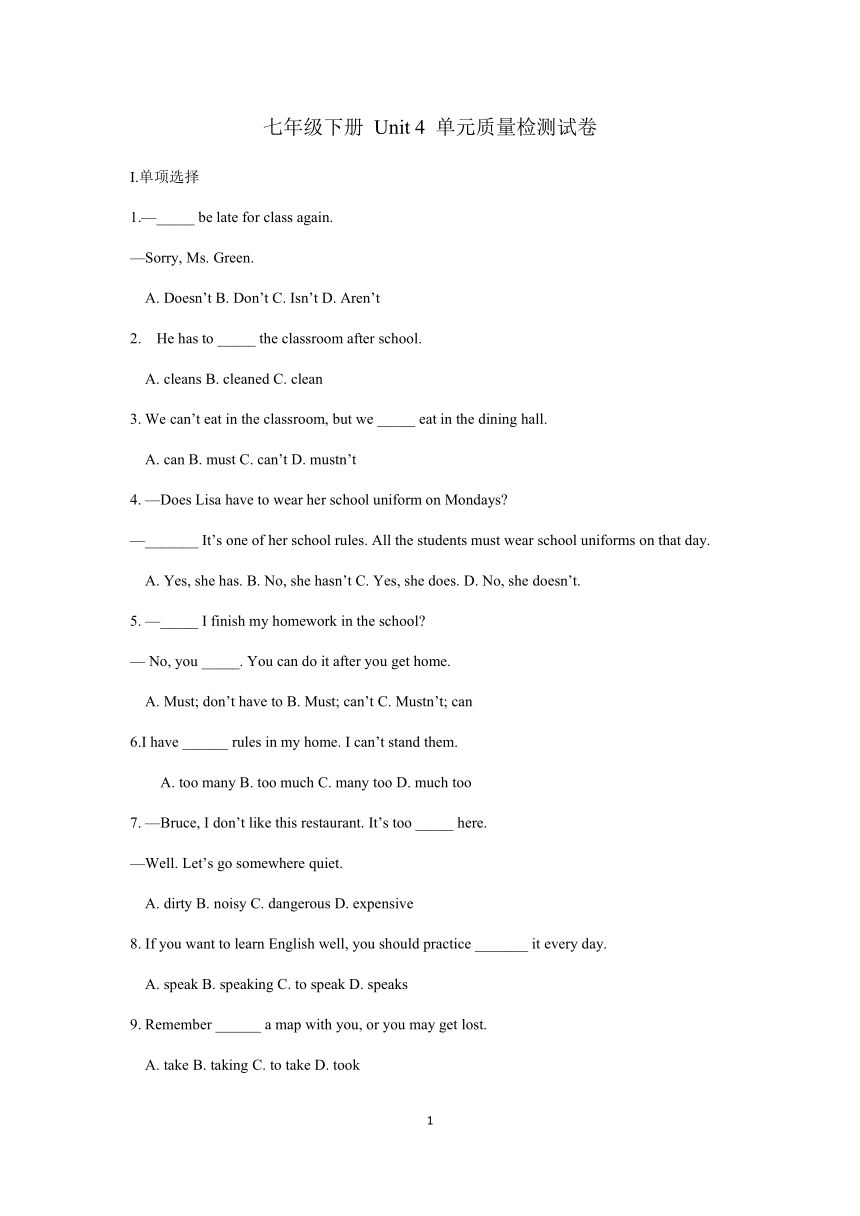 | |
| 格式 | zip | ||
| 文件大小 | 338.4KB | ||
| 资源类型 | 教案 | ||
| 版本资源 | 人教新目标(Go for it)版 | ||
| 科目 | 英语 | ||
| 更新时间 | 2020-06-11 11:48:33 | ||
图片预览

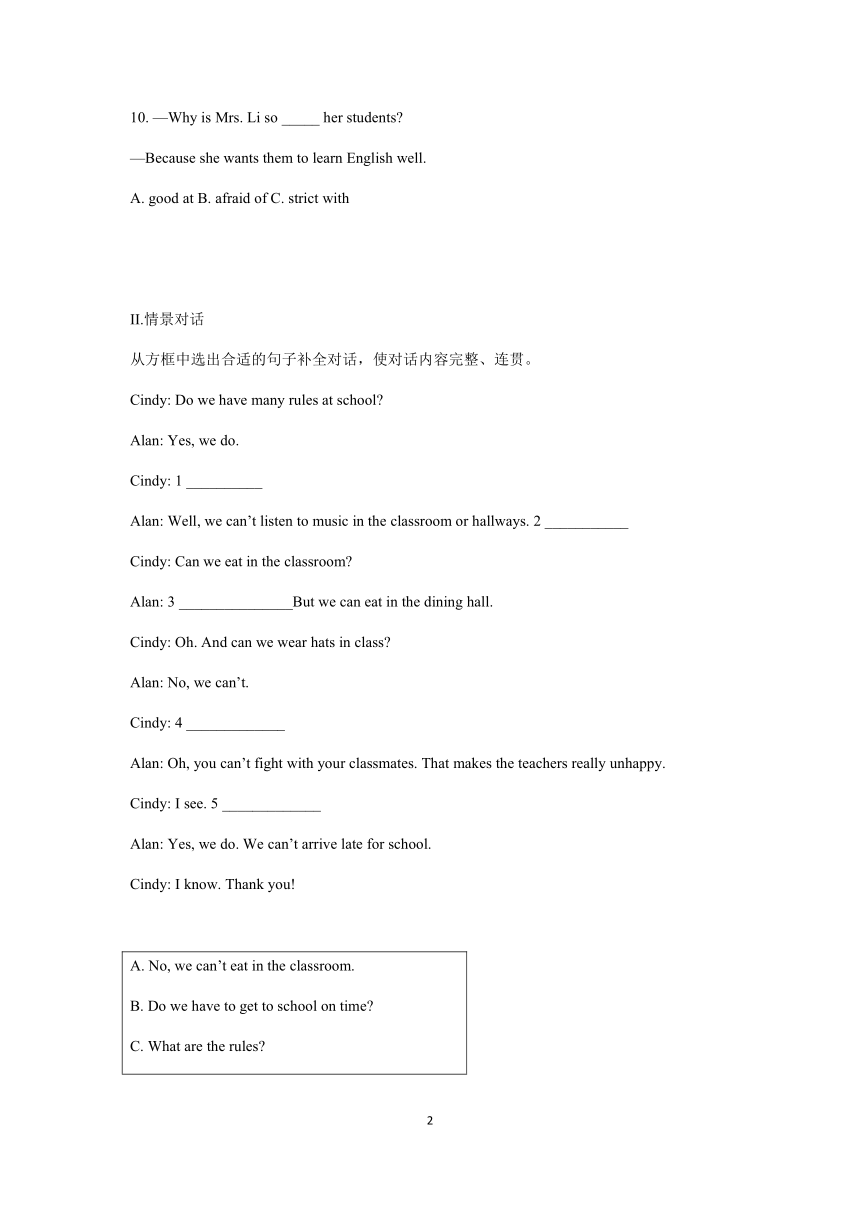
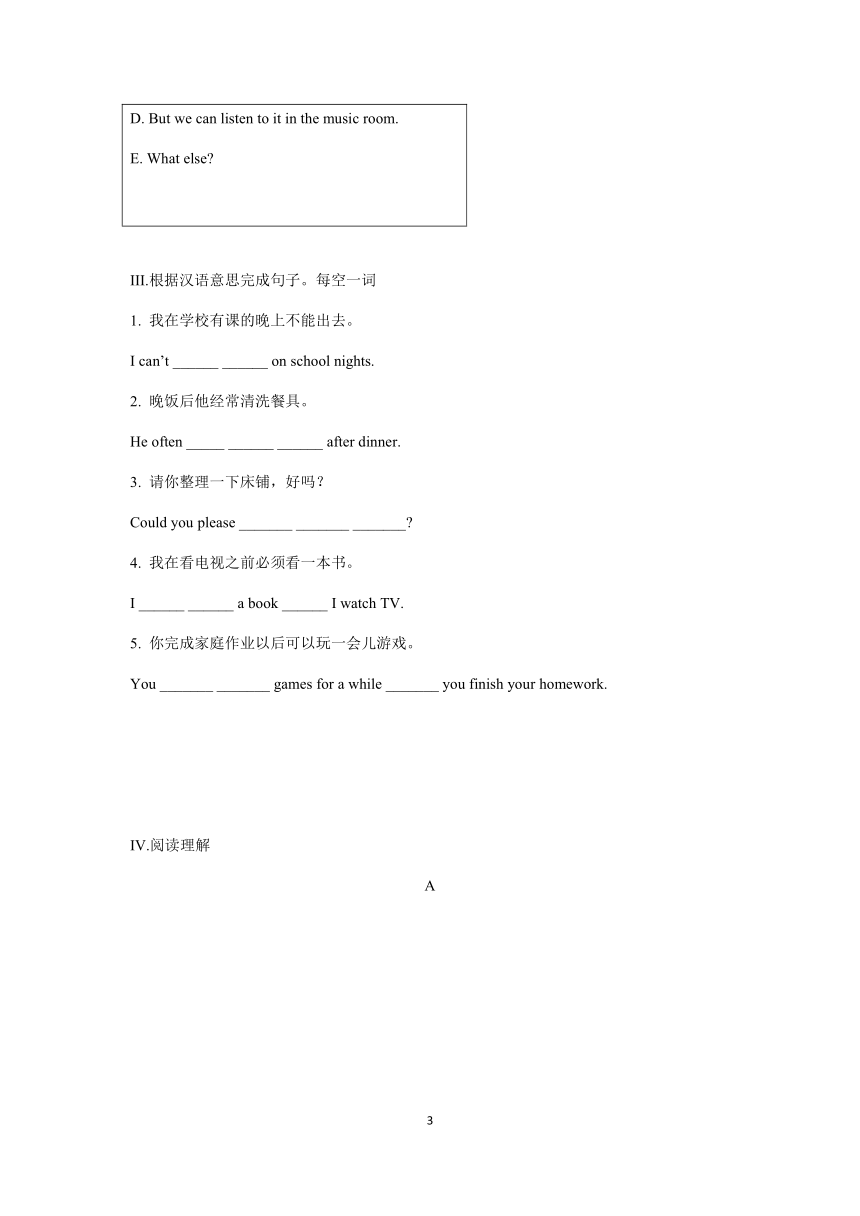
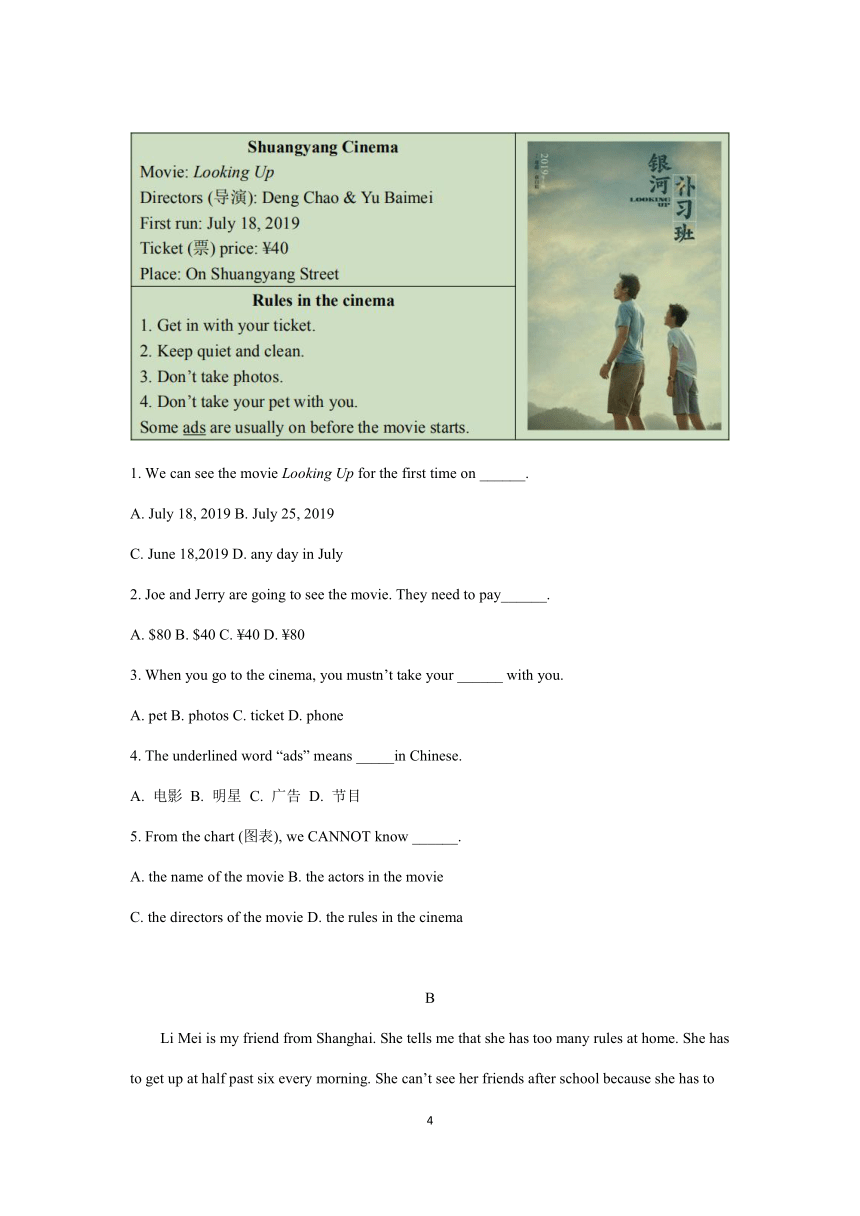
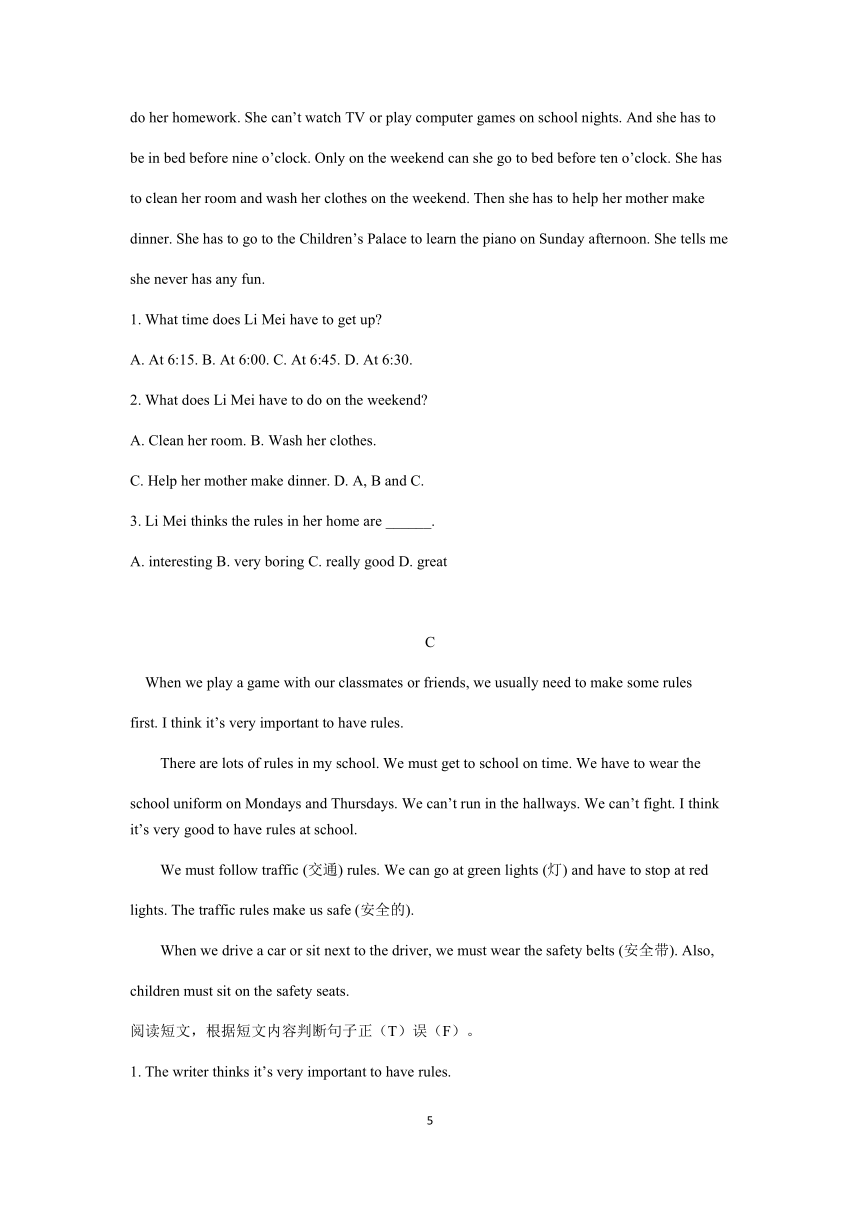
文档简介
七年级下册
Unit
4
单元质量检测试卷
I.单项选择
1.—_____
be
late
for
class
again.
—Sorry,
Ms.
Green.
A.
Doesn’t
B.
Don’t
C.
Isn’t
D.
Aren’t
2.
He
has
to
_____
the
classroom
after
school.
A.
cleans
B.
cleaned
C.
clean
3.
We
can’t
eat
in
the
classroom,
but
we
_____
eat
in
the
dining
hall.
A.
can
B.
must
C.
can’t
D.
mustn’t
4.
—Does
Lisa
have
to
wear
her
school
uniform
on
Mondays?
—_______
It’s
one
of
her
school
rules.
All
the
students
must
wear
school
uniforms
on
that
day.
A.
Yes,
she
has.
B.
No,
she
hasn’t
C.
Yes,
she
does.
D.
No,
she
doesn’t.
5.
—_____
I
finish
my
homework
in
the
school?
—
No,
you
_____.
You
can
do
it
after
you
get
home.
A.
Must;
don’t
have
to
B.
Must;
can’t
C.
Mustn’t;
can
6.I
have
______
rules
in
my
home.
I
can’t
stand
them.
A.
too
many
B.
too
much
C.
many
too
D.
much
too
7.
—Bruce,
I
don’t
like
this
restaurant.
It’s
too
_____
here.
—Well.
Let’s
go
somewhere
quiet.
A.
dirty
B.
noisy
C.
dangerous
D.
expensive
8.
If
you
want
to
learn
English
well,
you
should
practice
_______
it
every
day.
A.
speak
B.
speaking
C.
to
speak
D.
speaks
9.
Remember
______
a
map
with
you,
or
you
may
get
lost.
A.
take
B.
taking
C.
to
take
D.
took
10.
—Why
is
Mrs.
Li
so
_____
her
students?
—Because
she
wants
them
to
learn
English
well.
A.
good
at
B.
afraid
of
C.
strict
with
II.情景对话
从方框中选出合适的句子补全对话,使对话内容完整、连贯。
Cindy:
Do
we
have
many
rules
at
school?
Alan:
Yes,
we
do.
Cindy:
1
__________
Alan:
Well,
we
can’t
listen
to
music
in
the
classroom
or
hallways.
2
___________
Cindy:
Can
we
eat
in
the
classroom?
Alan:
3
_______________But
we
can
eat
in
the
dining
hall.
Cindy:
Oh.
And
can
we
wear
hats
in
class?
Alan:
No,
we
can’t.
Cindy:
4
_____________
Alan:
Oh,
you
can’t
fight
with
your
classmates.
That
makes
the
teachers
really
unhappy.
Cindy:
I
see.
5
_____________
Alan:
Yes,
we
do.
We
can’t
arrive
late
for
school.
Cindy:
I
know.
Thank
you!
A.
No,
we
can’t
eat
in
the
classroom.
B.
Do
we
have
to
get
to
school
on
time?
C.
What
are
the
rules?
D.
But
we
can
listen
to
it
in
the
music
room.
E.
What
else?
III.根据汉语意思完成句子。每空一词
1.
我在学校有课的晚上不能出去。
I
can’t
______
______
on
school
nights.
2.
晚饭后他经常清洗餐具。
He
often
_____
______
______
after
dinner.
3.
请你整理一下床铺,好吗?
Could
you
please
_______
_______
_______?
4.
我在看电视之前必须看一本书。
I
______
______
a
book
______
I
watch
TV.
5.
你完成家庭作业以后可以玩一会儿游戏。
You
_______
_______
games
for
a
while
_______
you
finish
your
homework.
IV.阅读理解
A
1.
We
can
see
the
movie
Looking
Up
for
the
first
time
on
______.
A.
July
18,
2019
B.
July
25,
2019
C.
June
18,2019
D.
any
day
in
July
2.
Joe
and
Jerry
are
going
to
see
the
movie.
They
need
to
pay______.
A.
$80
B.
$40
C.
?40
D.
?80
3.
When
you
go
to
the
cinema,
you
mustn’t
take
your
______
with
you.
A.
pet
B.
photos
C.
ticket
D.
phone
4.
The
underlined
word
“ads”
means
_____in
Chinese.
A.
电影
B.
明星
C.
广告
D.
节目
5.
From
the
chart
(图表),
we
CANNOT
know
______.
A.
the
name
of
the
movie
B.
the
actors
in
the
movie
C.
the
directors
of
the
movie
D.
the
rules
in
the
cinema
B
Li
Mei
is
my
friend
from
Shanghai.
She
tells
me
that
she
has
too
many
rules
at
home.
She
has
to
get
up
at
half
past
six
every
morning.
She
can’t
see
her
friends
after
school
because
she
has
to
do
her
homework.
She
can’t
watch
TV
or
play
computer
games
on
school
nights.
And
she
has
to
be
in
bed
before
nine
o’clock.
Only
on
the
weekend
can
she
go
to
bed
before
ten
o’clock.
She
has
to
clean
her
room
and
wash
her
clothes
on
the
weekend.
Then
she
has
to
help
her
mother
make
dinner.
She
has
to
go
to
the
Children’s
Palace
to
learn
the
piano
on
Sunday
afternoon.
She
tells
me
she
never
has
any
fun.
1.
What
time
does
Li
Mei
have
to
get
up?
A.
At
6:15.
B.
At
6:00.
C.
At
6:45.
D.
At
6:30.
2.
What
does
Li
Mei
have
to
do
on
the
weekend?
A.
Clean
her
room.
B.
Wash
her
clothes.
C.
Help
her
mother
make
dinner.
D.
A,
B
and
C.
3.
Li
Mei
thinks
the
rules
in
her
home
are
______.
A.
interesting
B.
very
boring
C.
really
good
D.
great
C
When
we
play
a
game
with
our
classmates
or
friends,
we
usually
need
to
make
some
rules
first.
I
think
it’s
very
important
to
have
rules.
There
are
lots
of
rules
in
my
school.
We
must
get
to
school
on
time.
We
have
to
wear
the
school
uniform
on
Mondays
and
Thursdays.
We
can’t
run
in
the
hallways.
We
can’t
fight.
I
think
it’s
very
good
to
have
rules
at
school.
We
must
follow
traffic
(交通)
rules.
We
can
go
at
green
lights
(灯)
and
have
to
stop
at
red
lights.
The
traffic
rules
make
us
safe
(安全的).
When
we
drive
a
car
or
sit
next
to
the
driver,
we
must
wear
the
safety
belts
(安全带).
Also,
children
must
sit
on
the
safety
seats.
阅读短文,根据短文内容判断句子正(T)误(F)。
1.
The
writer
thinks
it’s
very
important
to
have
rules.
2.
The
students
have
to
wear
the
school
uniform
on
Mondays
and
Tuesdays.
3.
The
students
can’t
run
in
the
hallways.
4.
We
can
go
at
red
lights
and
have
to
stop
at
green
lights.
5.
When
we
drive
a
car
or
sit
next
to
the
driver,
we
shouldn’t
wear
the
safety
belts.
V:任务型阅读
根据表格内容,回答下列问题。
1.
How
many
things
mustn’t
you
do
when
you’re
in
the
school?
______________________________________________________
2.
Can
you
leave
school
at
lunchtime?
______________________________________________________
3.
What
must
you
do
when
your
teacher
comes
into
the
classroom?
______________________________________________________
4.
When
must
you
get
to
school
every
morning?
______________________________________________________
5.
How
many
rules
are
there
in
the
form?
______________________________________________________
VI.按要求完成句子。每空一词
1.
We
have
to
eat
outside.
(改为否定句)
We
______
______
______
eat
outside.
2.
He
has
to
finish
his
work
today.
(改为一般疑问句,并作否定回答)
—_____
______
______
______
finish
his
work
today?
—No,
______
______.
3.
You
can’t
run
in
the
classroom.
(改为祈使句)
______
______
in
the
classroom.
4.
Students
have
to
be
quiet
in
the
library.
(改为一般疑问句,并作肯定回答)
—_______
students
______
______
be
quiet
in
the
library?
—Yes,
______
______.
5.
We
can
eat
in
the
classroom.
(改为否定句)
We
_____
_____
in
the
classroom.
VII.书面表达
每所学校都有规章制度,下面是你们学校的一些规章制度。请你根据提示,以“School
Rules”为题,写一篇短文,向新生
Mary
做一下介绍。
内容包括:1.
上课不能迟到;
2.
教室要保持(keep)干净和安静;
3.
见到老师要问好(greet);
4.
不允许在教室里吃东西;
5.
不许在课堂上听音乐、玩游戏;
6.
不要摘花、爬树(pick
flowers;climb
trees)。
要求:1.
词数为
60
左右。
2.
必须包含上述所有要点,可适当发挥想象。
____________________________________________________________________________
____________________________________________________________________________
____________________________________________________________________________
____________________________________________________________________________
____________________________________________________________________________
参考答案:
I.1-5
BCACA
6-10ABBCC
II.CDAEB
III.
1.
go
out
2.
does
the
dishes
3.
make
the
/
your
bed
4.
must
read;
before
5.
can
play;
after
IV.
A.1-5ADACB
B:1-3DDB
C:1-5
TFTFF
V:
1.
Seven
/
7.
根据
You
mustn’t
中的规定可知,关于不能做的事情的规定有七条。
2.
No,
I/we
can’t.
根据
You
mustn’t
中的规定
Leave
school
at
break
time
or
lunchtime.”可知,
午饭时间不能离开学校。
3.
We/I
must
stand
up.
根据
You
must
中的规定“Stand
up
when
a
teacher
comes
into
the
classroom.”可知,老师进来的时候,应该站起来。
4.
By
half
past
seven
/
seven
thirty
/7:30.
根据
You
must
中的规定“Arrive
at
school
by
half
past
seven.”可知,必须在
7
点半之前到校。
5.
Fourteen
/
14.
表格中一共列举了
14
条规定。
VI;
1.
don’t
have
to
2.
Does
he
have
to;
he
doesn’t
3.
Don’t
run
4.
Do;
have
to;
they
do
5.
can’t
eat
VII.
School
Rules
Hello,
Mary.
You
are
new
in
our
school.
We
have
many
rules
in
our
school.
We
can’t
be
late
for
class.
We
have
to
keep
the
classroom
clean
and
quiet.
We
have
to
greet
them
when
we
see
the
teachers.
We
can’t
eat
in
the
classroom.
Don’t
listen
to
music
or
play
games
in
class.
Don’t
pick
flowers
or
climb
trees.
Unit
4
单元质量检测试卷
I.单项选择
1.—_____
be
late
for
class
again.
—Sorry,
Ms.
Green.
A.
Doesn’t
B.
Don’t
C.
Isn’t
D.
Aren’t
2.
He
has
to
_____
the
classroom
after
school.
A.
cleans
B.
cleaned
C.
clean
3.
We
can’t
eat
in
the
classroom,
but
we
_____
eat
in
the
dining
hall.
A.
can
B.
must
C.
can’t
D.
mustn’t
4.
—Does
Lisa
have
to
wear
her
school
uniform
on
Mondays?
—_______
It’s
one
of
her
school
rules.
All
the
students
must
wear
school
uniforms
on
that
day.
A.
Yes,
she
has.
B.
No,
she
hasn’t
C.
Yes,
she
does.
D.
No,
she
doesn’t.
5.
—_____
I
finish
my
homework
in
the
school?
—
No,
you
_____.
You
can
do
it
after
you
get
home.
A.
Must;
don’t
have
to
B.
Must;
can’t
C.
Mustn’t;
can
6.I
have
______
rules
in
my
home.
I
can’t
stand
them.
A.
too
many
B.
too
much
C.
many
too
D.
much
too
7.
—Bruce,
I
don’t
like
this
restaurant.
It’s
too
_____
here.
—Well.
Let’s
go
somewhere
quiet.
A.
dirty
B.
noisy
C.
dangerous
D.
expensive
8.
If
you
want
to
learn
English
well,
you
should
practice
_______
it
every
day.
A.
speak
B.
speaking
C.
to
speak
D.
speaks
9.
Remember
______
a
map
with
you,
or
you
may
get
lost.
A.
take
B.
taking
C.
to
take
D.
took
10.
—Why
is
Mrs.
Li
so
_____
her
students?
—Because
she
wants
them
to
learn
English
well.
A.
good
at
B.
afraid
of
C.
strict
with
II.情景对话
从方框中选出合适的句子补全对话,使对话内容完整、连贯。
Cindy:
Do
we
have
many
rules
at
school?
Alan:
Yes,
we
do.
Cindy:
1
__________
Alan:
Well,
we
can’t
listen
to
music
in
the
classroom
or
hallways.
2
___________
Cindy:
Can
we
eat
in
the
classroom?
Alan:
3
_______________But
we
can
eat
in
the
dining
hall.
Cindy:
Oh.
And
can
we
wear
hats
in
class?
Alan:
No,
we
can’t.
Cindy:
4
_____________
Alan:
Oh,
you
can’t
fight
with
your
classmates.
That
makes
the
teachers
really
unhappy.
Cindy:
I
see.
5
_____________
Alan:
Yes,
we
do.
We
can’t
arrive
late
for
school.
Cindy:
I
know.
Thank
you!
A.
No,
we
can’t
eat
in
the
classroom.
B.
Do
we
have
to
get
to
school
on
time?
C.
What
are
the
rules?
D.
But
we
can
listen
to
it
in
the
music
room.
E.
What
else?
III.根据汉语意思完成句子。每空一词
1.
我在学校有课的晚上不能出去。
I
can’t
______
______
on
school
nights.
2.
晚饭后他经常清洗餐具。
He
often
_____
______
______
after
dinner.
3.
请你整理一下床铺,好吗?
Could
you
please
_______
_______
_______?
4.
我在看电视之前必须看一本书。
I
______
______
a
book
______
I
watch
TV.
5.
你完成家庭作业以后可以玩一会儿游戏。
You
_______
_______
games
for
a
while
_______
you
finish
your
homework.
IV.阅读理解
A
1.
We
can
see
the
movie
Looking
Up
for
the
first
time
on
______.
A.
July
18,
2019
B.
July
25,
2019
C.
June
18,2019
D.
any
day
in
July
2.
Joe
and
Jerry
are
going
to
see
the
movie.
They
need
to
pay______.
A.
$80
B.
$40
C.
?40
D.
?80
3.
When
you
go
to
the
cinema,
you
mustn’t
take
your
______
with
you.
A.
pet
B.
photos
C.
ticket
D.
phone
4.
The
underlined
word
“ads”
means
_____in
Chinese.
A.
电影
B.
明星
C.
广告
D.
节目
5.
From
the
chart
(图表),
we
CANNOT
know
______.
A.
the
name
of
the
movie
B.
the
actors
in
the
movie
C.
the
directors
of
the
movie
D.
the
rules
in
the
cinema
B
Li
Mei
is
my
friend
from
Shanghai.
She
tells
me
that
she
has
too
many
rules
at
home.
She
has
to
get
up
at
half
past
six
every
morning.
She
can’t
see
her
friends
after
school
because
she
has
to
do
her
homework.
She
can’t
watch
TV
or
play
computer
games
on
school
nights.
And
she
has
to
be
in
bed
before
nine
o’clock.
Only
on
the
weekend
can
she
go
to
bed
before
ten
o’clock.
She
has
to
clean
her
room
and
wash
her
clothes
on
the
weekend.
Then
she
has
to
help
her
mother
make
dinner.
She
has
to
go
to
the
Children’s
Palace
to
learn
the
piano
on
Sunday
afternoon.
She
tells
me
she
never
has
any
fun.
1.
What
time
does
Li
Mei
have
to
get
up?
A.
At
6:15.
B.
At
6:00.
C.
At
6:45.
D.
At
6:30.
2.
What
does
Li
Mei
have
to
do
on
the
weekend?
A.
Clean
her
room.
B.
Wash
her
clothes.
C.
Help
her
mother
make
dinner.
D.
A,
B
and
C.
3.
Li
Mei
thinks
the
rules
in
her
home
are
______.
A.
interesting
B.
very
boring
C.
really
good
D.
great
C
When
we
play
a
game
with
our
classmates
or
friends,
we
usually
need
to
make
some
rules
first.
I
think
it’s
very
important
to
have
rules.
There
are
lots
of
rules
in
my
school.
We
must
get
to
school
on
time.
We
have
to
wear
the
school
uniform
on
Mondays
and
Thursdays.
We
can’t
run
in
the
hallways.
We
can’t
fight.
I
think
it’s
very
good
to
have
rules
at
school.
We
must
follow
traffic
(交通)
rules.
We
can
go
at
green
lights
(灯)
and
have
to
stop
at
red
lights.
The
traffic
rules
make
us
safe
(安全的).
When
we
drive
a
car
or
sit
next
to
the
driver,
we
must
wear
the
safety
belts
(安全带).
Also,
children
must
sit
on
the
safety
seats.
阅读短文,根据短文内容判断句子正(T)误(F)。
1.
The
writer
thinks
it’s
very
important
to
have
rules.
2.
The
students
have
to
wear
the
school
uniform
on
Mondays
and
Tuesdays.
3.
The
students
can’t
run
in
the
hallways.
4.
We
can
go
at
red
lights
and
have
to
stop
at
green
lights.
5.
When
we
drive
a
car
or
sit
next
to
the
driver,
we
shouldn’t
wear
the
safety
belts.
V:任务型阅读
根据表格内容,回答下列问题。
1.
How
many
things
mustn’t
you
do
when
you’re
in
the
school?
______________________________________________________
2.
Can
you
leave
school
at
lunchtime?
______________________________________________________
3.
What
must
you
do
when
your
teacher
comes
into
the
classroom?
______________________________________________________
4.
When
must
you
get
to
school
every
morning?
______________________________________________________
5.
How
many
rules
are
there
in
the
form?
______________________________________________________
VI.按要求完成句子。每空一词
1.
We
have
to
eat
outside.
(改为否定句)
We
______
______
______
eat
outside.
2.
He
has
to
finish
his
work
today.
(改为一般疑问句,并作否定回答)
—_____
______
______
______
finish
his
work
today?
—No,
______
______.
3.
You
can’t
run
in
the
classroom.
(改为祈使句)
______
______
in
the
classroom.
4.
Students
have
to
be
quiet
in
the
library.
(改为一般疑问句,并作肯定回答)
—_______
students
______
______
be
quiet
in
the
library?
—Yes,
______
______.
5.
We
can
eat
in
the
classroom.
(改为否定句)
We
_____
_____
in
the
classroom.
VII.书面表达
每所学校都有规章制度,下面是你们学校的一些规章制度。请你根据提示,以“School
Rules”为题,写一篇短文,向新生
Mary
做一下介绍。
内容包括:1.
上课不能迟到;
2.
教室要保持(keep)干净和安静;
3.
见到老师要问好(greet);
4.
不允许在教室里吃东西;
5.
不许在课堂上听音乐、玩游戏;
6.
不要摘花、爬树(pick
flowers;climb
trees)。
要求:1.
词数为
60
左右。
2.
必须包含上述所有要点,可适当发挥想象。
____________________________________________________________________________
____________________________________________________________________________
____________________________________________________________________________
____________________________________________________________________________
____________________________________________________________________________
参考答案:
I.1-5
BCACA
6-10ABBCC
II.CDAEB
III.
1.
go
out
2.
does
the
dishes
3.
make
the
/
your
bed
4.
must
read;
before
5.
can
play;
after
IV.
A.1-5ADACB
B:1-3DDB
C:1-5
TFTFF
V:
1.
Seven
/
7.
根据
You
mustn’t
中的规定可知,关于不能做的事情的规定有七条。
2.
No,
I/we
can’t.
根据
You
mustn’t
中的规定
Leave
school
at
break
time
or
lunchtime.”可知,
午饭时间不能离开学校。
3.
We/I
must
stand
up.
根据
You
must
中的规定“Stand
up
when
a
teacher
comes
into
the
classroom.”可知,老师进来的时候,应该站起来。
4.
By
half
past
seven
/
seven
thirty
/7:30.
根据
You
must
中的规定“Arrive
at
school
by
half
past
seven.”可知,必须在
7
点半之前到校。
5.
Fourteen
/
14.
表格中一共列举了
14
条规定。
VI;
1.
don’t
have
to
2.
Does
he
have
to;
he
doesn’t
3.
Don’t
run
4.
Do;
have
to;
they
do
5.
can’t
eat
VII.
School
Rules
Hello,
Mary.
You
are
new
in
our
school.
We
have
many
rules
in
our
school.
We
can’t
be
late
for
class.
We
have
to
keep
the
classroom
clean
and
quiet.
We
have
to
greet
them
when
we
see
the
teachers.
We
can’t
eat
in
the
classroom.
Don’t
listen
to
music
or
play
games
in
class.
Don’t
pick
flowers
or
climb
trees.
同课章节目录
- Unit 1 Can you play the guitar?
- Section A
- Section B
- Unit 2 What time do you go to school?
- Section A
- Section B
- Unit 3 How do you get to school?
- Section A
- Section B
- Unit 4 Don't eat in class.
- Section A
- Section B
- Unit 5 Why do you like pandas?
- Section A
- Section B
- Unit 6 I'm watching TV.
- Section A
- Section B
- Review of Units 1-6
- Unit 7 It's raining!
- Section A
- Section B
- Unit 8 Is there a post office near here?
- Section A
- Section B
- Unit 9 What does he look like?
- Section A
- Section B
- Unit 10 I'd like some noodles.
- Section A
- Section B
- Unit 11 How was your school trip?
- Section A
- Section B
- Unit 12 What did you do last weekend?
- Section A
- Section B
